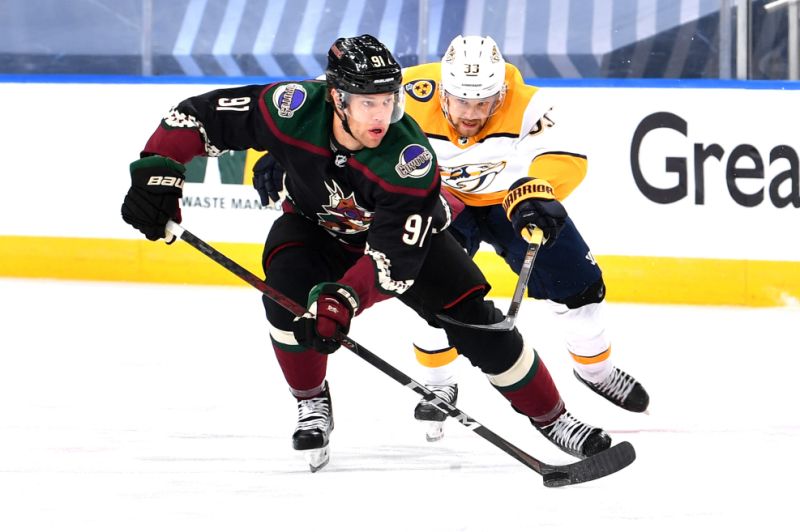
In a season shrouded with uncertainty, teams are being thrown for even more of a tailspin because of a change in plans regarding the salary cap. According to Eric Francis of Sportsnet, NHL deputy commissioner Bill Daly had told teams prior to the COVID-19 pandemic that there was expected to be a substantial increase in the cap ceiling. It’s reasonable to assume that many teams came up with a game plan for the offseason with this increase in mind.
The 2019-20 salary cap was $81.5 million, and Daly estimated that the cap would go up to a number between $84 and $88.2 million for 20-21. This is a huge increase when you look at how many teams are now cap-strapped due to the stagnancy, and are struggling to make typical offseason transactions.
Let’s consider which teams are buyers and sellers in the offseason. Most often, we see teams that feel as though they are one or two pieces away from competing for the Stanley Cup making roster additions. They try everything they can to do this while maintaining the integrity of their core. On the flip side, if a team feels like they are too far away from competing with its current make-up, they are likely to trade away coveted players for future assets.
This notion has been completely flipped on its head, as general managers are being forced to get creative with how they pick up free agents, or navigate the intricacies of a trade. And it’s all due to the salary cap remaining stagnant.

Take the Columbus Blue Jackets, for example. Some background; they are a playoff-contending team. Their offense could use some help though, as they have been a score-by-committee type of team for years. Under normal circumstances, this is a team that we would consider buyers; they need that one extra piece that will put them into the next tier of contending teams.
Given the situation, they have had to become a sort of hybrid buyer/seller. In other words, in order to make a big play in free agency, they needed to dump salary. They did this by trading away roster players Markus Nutivaara and Ryan Murray for what essentially equates to nothing. Then they bought out center, Alex Wennberg. They will now be paying him not to play for their team; hardly the kind of move GMs like to make.
In a normal season where Columbus wouldn’t be forced to make these moves, losing out on a FA target doesn’t take away from their roster. But considering the extenuating circumstances, if they miss out on their rumored target Taylor Hall (according to Aaron Portzline), then they actually come out of this offseason worse than before.
Similar situations have arisen with teams like the Vegas Golden Knights or the Tampa Bay Lightning.
Both of these teams have proven themselves to be perennial Stanley Cup contenders, and their state taxes are much more forgiving to professional athletes. This all goes to show why they are some of the most popular free agent destinations.

The Golden Knights are rumored to be in on the Alex Pietrangelo sweepstakes according to Pierre LeBrun. Already cap-strapped themselves, they were forced to part ways with a dependable second-line center in Paul Stastny and his hefty contract in order to even be able to offer Pietrangelo in the first place. If it pays off, good for them, they’re probably better off for it. But if not, then they, like the Blue Jackets, went to drastic lengths all for nothing.
The Tampa Bay Lightning are in a situation where they need to re-sign their young, restricted free agents Mikhail Sergachev and Anthony Cirelli, among others. In a year where the cap could’ve risen by as much as $6.7 million, this task originally seemed achievable. Unfortunately, they knew where they stood against the stagnant cap. Knowing this, they asked a vital, contributing piece in Tyler Johnson to waive his no-trade clause. He takes up a large percentage of the payroll, and with other players outshining him, he was deemed expendable. He denied, and according to Greg Wyshynski, he was then placed on waivers, clearing them on Saturday morning. This all equates to the Lightning likely losing him for nothing in order to be able to make space for the young up and comers.
In a unique offseason (that basically included the playoffs), it’s starting to feel like we should expect the unexpected. Free agent deals are going to happen one way or the other. However, due to so many teams taking these unexpected measures in order to be in the running, it is likely that many teams will be dealt extremely unlucky hands. Good luck to GMs, and good riddance to players with questionable deals.
For more NHL coverage, click here.

Must See
-


Basketball
/ 3 years agoScouting Reports and Team Fits for 5 of the Top Prospects in the 2022 NBA Draft
Even with the NBA playoffs raging on into late May, eliminated teams have turned...
-


Athlete Profiles
/ 3 years agoSteven Kwan: Doubt Turned to Success
“The approach and frame show zero promise for game power. Despite having a hit...
By Matthew Suh -


Columns
/ 3 years agoBird’s MLB Season Predictions
Well, welcome back baseball! After a 99 day lockout, which pitted players versus owners...
By Ed Birdsall











